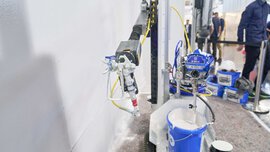The construction site goes digital
December 6, 2023
- Specifically counteracting the skilled worker shortage with digitalization
- Focus on robotics, AI, blockchain, and big data at digitalBAU 2024
- Optimum working conditions for everyone at the construction site of the future
digitalBAU 2024, taking place from February 20 to 22, 2024 at the Cologne Exhibition Center, will cover all aspects of the life cycle of buildings—on the path to an end-to-end recycling chain that conserves our scarce resources. Digital tools, forward-looking services, and the consistent digital transformation of the construction industry are seen as the key to climate-friendly construction, making them an important component of Germany’s digital strategy. At digitalBAU, visitors will find out where the industry stands today, which digital methods are already being used, and what potential technologies such as big data, blockchain, and artificial intelligence offer.
Digitalization is a megatrend that has a fundamental impact on all areas of our lives, and will continue to revolutionize them today and in the future. And what we already use intensively in our private lives with smartphones and tablets, VR glasses and augmented reality is also becoming increasingly important in our working world. This transition is taking place across all key technologies in industry. The construction industry is an important player in the midst of the digital revolution. The shift from analog to digital processes is creating new products and services almost every week. 3D-printed houses, robotics at the construction site, artificial intelligence (AI), big data, and multifunctional platforms or interdisciplinary planning tools—what seemed so far off just a few years ago has long since become reality.
The industry is highly fragmented and there is a lack of key skilled workers
Despite technological progress in the industry, construction remains in many areas a complex interplay between many disciplines and numerous players. In addition, the construction industry is highly fragmented. In 2022, the share of companies in the main construction trades in Germany with fewer than 20 employees was 88 percent. That contrasts with the manufacturing industry, which has been optimized for series production for decades.
At the same time, the industry is suffering from a shortage of skilled workers. In a 2021 survey of 1,900 construction companies in Europe, the U.S. and China, 44 percent said they struggled to recruit skilled workers for construction jobs. One way to meet this shortage is to consistently automate the construction process. That allows standard processes in particular to be digitalized and optimized; the targeted use of machines and robots also minimizes heavy manual work or monotonous, repetitive tasks. Such measures make jobs in construction more varied, construction site activities less dependent on the weather, and increase their appeal for digital natives through the large-scale use of contemporary technologies outside in everyday project work.
Automation, robotics, and AI reach construction
Robotics in construction offers huge potential to boost productivity in the construction industry. Robots are already taking on numerous tasks such as the prefabrication of building elements, the production of modular houses, robot-assisted welding, bricklaying, drilling, and plastering, or the accurate 3D printing of entire stories right at the construction site. Added to that is the growing importance of artificial intelligence (AI). It represents vast potential for the construction industry, and supports the entire construction value chain. From automated planning tools and online-based intelligent databases to quality assurance and occupational safety at the construction site, AI can help reduce sources of error, optimize processes, and make projects more efficient.
The construction industry has also discovered blockchain technology. It offers transparency and security for contracts and transactions. For instance, data on the documentation of materials used, CO2 costs and any compensation measures can be stored in a tamper-proof manner. As a result, buildings documented on the blockchain have proven to be attractive for developers and investors.
The value of labor will steadily increase
Anja Gierstorfer, Exhibition Manager of digitalBAU, sees the simplification of everyday work at the construction site through digital tools and intelligent robots as a key task for the years to come: “In the future, a modern construction site will not only need to be optimized in terms of time and costs. Above all, it’s about the people outside in all weathers, for whom consistent digitalization will provide support and ease the strain of their demanding work, because their labor will be even more valuable in the future.” Anja Gierstorfer also sees the construction industry drawing level with other key industries: “The sector is setting a fast pace to quickly catch up with other branches of industry. Our exhibitors at digitalBAU 2024 will once again impressively demonstrate that. The big opportunity here is that conventional construction methods are being consistently challenged, workflows being redefined, and processes being developed holistically with the focus on the life cycle of a building. This is a great benefit for man and machine on our construction sites of the future!”
Belonging images



- PR Manager
